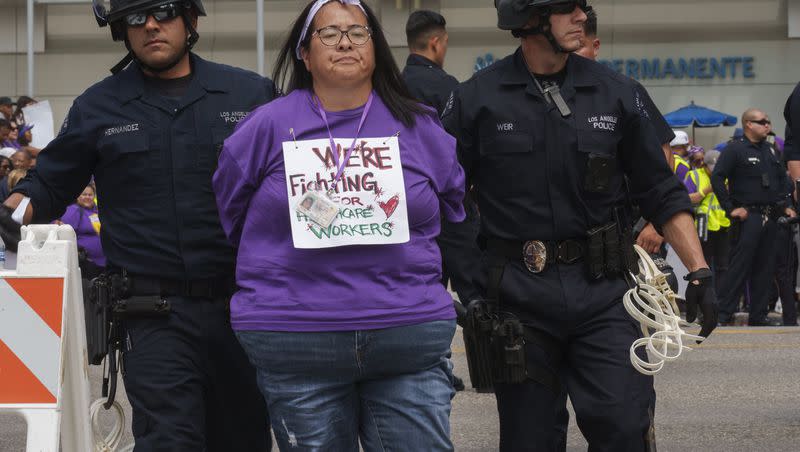Nation braces for largest health care worker strike ever

The nation’s largest strike of health care workers ever could begin Wednesday as more than 75,000 Kaiser Permanente employees prepare to leave work for three days over stalled negotiations.
The Washington Post said the strike is being prompted by an impasse over “pay, outsourcing and staffing problems” and notes “direct implications for thousands of patients nationwide.”
The existing labor contract ended late Saturday. And while negotiations could forestall a strike — which would impact Kaiser Permanente in California, Colorado, the District of Columbia, Oregon, Virginia and Washington — experts call it increasingly unlikely.
Per the Post, “The dispute comes against a backdrop of reinvigorated U.S. labor action, with unions asserting themselves amid surging inflation and post-pandemic labor shortages. The United Auto Workers recently began walkouts at the Big Three U.S. automakers, while a five-month Hollywood writers strike recently ended.”
When manufacturing and entertainment strikes occur, the impact can be delayed. Not so in health care, where patient care could be affected immediately. And the impact will vary in different locations. For instance, Kaiser told the Post that Virginia and D.C. union members plan to strike for a single day, while no one in Maryland plans to strike.
CNN reported that the coalition of potentially striking workers includes nurses, therapists, technicians, dietary services, maintenance and janitorial staff.
On a blog, Kaiser Permanente leadership said that its newest proposal included increasing pay, creating a new minimum wage for members of the coalition of unions, redesigning a performance-sharing plan, and doing more and faster hiring.
“While these plans to strike are disappointing, we remain committed to reaching an agreement that is good for our employees, our members, and our organization, and we will continue to bargain in good faith with the coalition,” the leaders said, noting “we are confident that we will reach an agreement that strengthens our position as a best place to work while ensuring that our high-quality care remains affordable and easy to access.”
Per CNN, “From the start of 2022 through August of this year, the Bureau of Labor Statistics has tracked 42 work stoppages of 1,000 or more strikers. Its count shows a third of those strikes were in the health care industry. That’s up from 24% of major strikes in 2019, the year before the pandemic. The increased number of health care strikes have happened despite health care workers making up only about 9% of private sector union members nationwide.”
John August, of Cornell University’s School of Industrial and Labor Relations, said it’s harder to convince health care workers to strike than those in other industries. He told CNN, “A strike is always emotional, no matter your profession. I don’t think many people ever want to go on strike. But for health care workers, it is different. You’re leaving babies, the elderly, the sick. There’s no question there's more of an emotional strain.”

